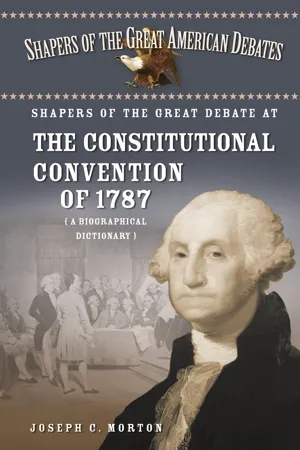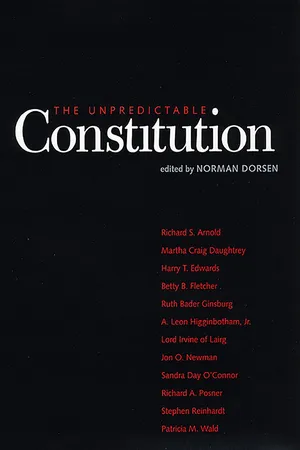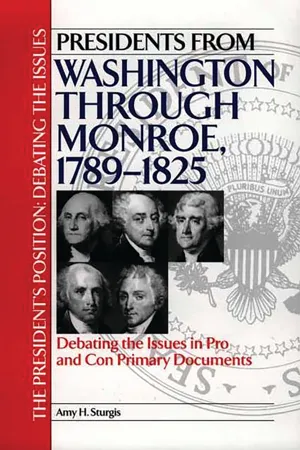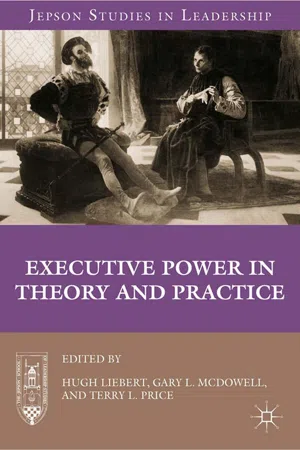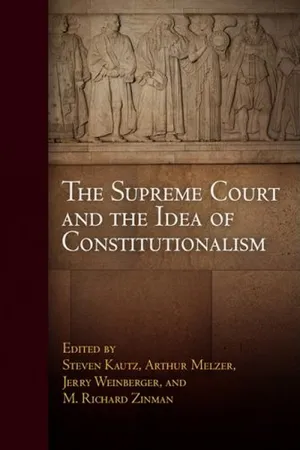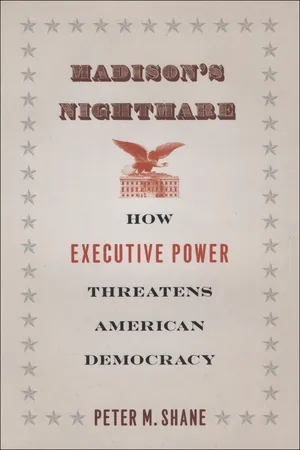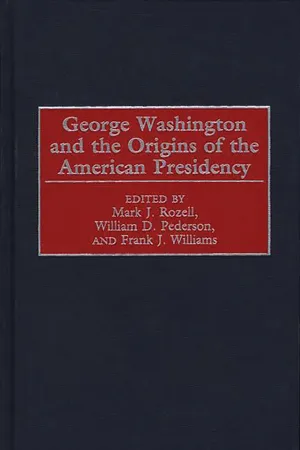History
President James Madison
James Madison was the fourth President of the United States, serving from 1809 to 1817. He played a key role in the drafting of the U.S. Constitution and the Bill of Rights, and is often referred to as the "Father of the Constitution." His presidency was marked by the War of 1812 against Britain and efforts to strengthen the federal government.
Written by Perlego with AI-assistance
Related key terms
1 of 5
8 Key excerpts on "President James Madison"
- eBook - PDF
Shapers of the Great Debate at the Constitutional Convention of 1787
A Biographical Dictionary
- Joseph Morton(Author)
- 2005(Publication Date)
- Greenwood(Publisher)
JAMES MADISON, JR. (1751-1836) James Madison has rightly been called "The Father of the Constitution." More than any other single individual, this frail, studious, self-conscious Virginia aristocrat was responsible for the calling of the Convention, for preparing a draft of a plan of government from which the Philadelphia Convention could work, for taking the most comprehensive notes at the Convention, for writing, along with Alexander Hamilton and John Jay, the informative The Federalist Papers, and for securing ratification of the Con- stitution in Virginia. Recognized by his compeers for his incredible energy, his creative political mind, and his innate intelligence, Madison seemingly spent his young, formative years preparing for his role as the "Architect of the United States Constitution." Born March 16, 1751, at his maternal grandparents' estate in Port Con- way, King George County, Virginia, to Eleanor ("Nellie") Rose Conway (1731-1829) and James Madison, Sr. (1723-1801), Jemmy, as he was in- variably called by friends and family, was the oldest of ten children. As the oldest son of locally prominent, aristocratic parents, James was given every advantage to succeed in the patriarchal, hierarchical society that was eighteenth-century Virginia. He received his earliest education from his mother and private tutors. His formal education commenced in 1762 (age 11) when he was sent to Donald Robertson's private school. Late in life, after his retirement from the presidency, James Madison was to claim that "All that I have been in life I owe largely to that man." After studying five years with Robertson, the precocious Jemmy spent two years (1767-1769) at home studying the classics under the demanding tutelage of the rector of the local Anglican Church (the Reverend Thomas Martin), who lived with the Madisons at their Montpelier plantation. - eBook - ePub
- Norman Dorsen(Author)
- 2001(Publication Date)
- NYU Press(Publisher)
He was a member of Congress both before and after the adoption of the Constitution, most notably in the first four Congresses of the new government, from 1789 to 1798. He drafted the Bill of Rights. He was, with Hamilton and Jay, the author of The Federalist Papers under the pen name “Publius.” 7 He was Secretary of State for eight years under President Thomas Jefferson, and in that capacity was the winning party (but what a Pyrrhic victory it was) in the most famous lawsuit in American history, an original action in the Supreme Court styled William Marbury v. James Madison, Secretary of State of the United States. 8 And, most importantly for present purposes, Mr. Madison was the prime mover in the drafting and adoption of the Constitution. He was the quintessential Founder, known for generations by the title “Father of the Constitution.” He was a constitutional and political scholar and logician of the first rank, though not encumbered by membership in the Bar, having studied law only briefly and never practiced. He was the leading intellectual force in the Constitutional Convention at Philadelphia in 1787, and through his notes of the proceedings, he is our main source of knowledge about what went on there. 9 And, at the crucial Virginia State Convention of 1788, at which the Constitution was ratified by the narrow margin of eighty-nine to seventy-nine, 10 Madison triumphed in debate over none other than that glorious orator of the Revolution, Patrick Henry. 11 Still, in spite of all these achievements and contributions, he was, in company with other leaders of his own and other times, viciously attacked in the press - eBook - PDF
Presidents from Washington through Monroe, 1789-1825
Debating the Issues in Pro and Con Primary Documents
- Amy H. Sturgis(Author)
- 2001(Publication Date)
- Greenwood(Publisher)
If war was inevitable, Madison showed satisfactory results. As the middle man in the Virginia Dynasty, delivering the momentum of the Revolution of 1800 into successor James Monroe's hands, bridging Jeffersonianism and the Era of Good Feelings, Madison could have done far worse. Madison's reputation as president has suffered from a variety of mod- ern prejudices. As a man, Madison possessed few of the glamorous at- tributes that make historical figures fascinating to mainstream audiences; he was short, small, quiet, with an intellectual wit and scholarly personality, with few vices, sexual or otherwise, to capture the imagi- nation. As a leader, he suffered from unfortunate timing; a war that had been brewing for years erupted during his administration, and scholars often equate war with failure. Madison's own brilliant wife overshadows him in public perception, as does the image of his closest friend, Thomas Jefferson. The values he embraced as Father of the U.S. Constitution and Democratic-Republican—the rigor of strict constructionism, the balance of state and national governments—are not emphasized by many in the current political debate. Madison nevertheless proved to be a competent steward of the nation and tradition he had inherited. He carried the country through the fire of warfare and delivered it intact to his chosen successor. Without Mad- ison, Jefferson's two terms would have reflected an aberration in the history of the presidency rather than the foundation of a dynasty in the White House. Jefferson lit the fire; Madison carried the torch. STATE/NATIONAL GOVERNMENT RELATIONS One of the first challenges to face President James Madison was a humorous farce of a problem that nonetheless raised a very serious issue: the relation between state and national governments. The story began decades earlier. The case first hit Pennsylvania courts in 1778, and even- tually went to the U.S. - eBook - ePub
Republics Ancient and Modern, Volume III
Inventions of Prudence: Constituting the American Regime
- Paul A. Rahe(Author)
- 2017(Publication Date)
- The University of North Carolina Press(Publisher)
James Madison and the New Science of PoliticsWe may appeal to every page of history we have hitherto turned over, for proofs irrefragable, that the people, when they have been unchecked, have been as unjust, tyrannical, brutal, barbarous, and cruel, as any king or senate possessed of uncontrollable power. The majority has eternally, and without one exception, usurped over the rights of the minority.—John AdamsIII. i.1
Despite its lasting fame, The Federalist is less a treatise in political philosophy composed for the ages than a work of political rhetoric aimed at a particular audience.1 All but the last eight numbers were written in extreme haste and first appeared in the popular press of New York City as a series of brief articles designed to explain and defend the new constitution devised for the United States of America at the federal convention held in Philadelphia from May to September 1787. The various numbers were then collected, corrected, and republished in two volumes in time for the New York Ratifying Convention.2Precisely two decades before the delegates from Britain’s former colonies gathered for the federal convention, Adam Ferguson had published in Edinburgh An Essay on the History of Civil Society . The twenty years separating the publication of Ferguson’s book and the framing of the American Constitution mark a watershed in human history. Before we can begin to understand what Hamilton, Madison, and Jay have to say, we must ponder the events of those two decades. We must consider their import as understood by the men of that age, and we must pause to reflect on the character of the audience which the authors of The Federalist addressed.Though virtually forgotten today, Ferguson was much esteemed at the time. A Gaelic-speaking Highlander, educated in the Lowlands and closely associated with David Hume and Adam Smith, he held in succession the chairs in natural philosophy, moral philosophy, and mathematics at Edinburgh in a period in which that university was generally regarded as the greatest in all of Europe. In the decades after its publication, his essay was to exercise a profound influence on economists and political theorists alike. Ferguson was no less aware of the unprecedented nature of the emerging new order than his two better-known friends. But unlike them, as we have already remarked, he had grave reservations concerning the consequences, for the experience of living in the Highlands and his years as chaplain to the Black Watch had left him with a deep and abiding appreciation for the virtues of the world soon to be lost.3 - eBook - PDF
- H. Liebert, G. McDowell, Terry L. Price, H. Liebert, G. McDowell, Terry L. Price(Authors)
- 2012(Publication Date)
- Palgrave Macmillan(Publisher)
Part of the reason for Madison’s and Jefferson’s influence over consti- tutional interpretation is that Madison withheld publication of his notes on the Constitutional Convention until after his death. In the absence of any clear record of how those debates developed, the default source for understanding the Constitution was The Federalist Papers, written primarily by Madison and Hamilton. By 1800, Jefferson and Madison were working hard to discredit Hamilton’s views as inconsistent with the theory of republican government, and with Jefferson’s election in 1800 and Hamilton’s death in 1804, Jefferson and Madison became the default authorities on the meaning of American constitutionalism. UnLock[e]ing Separation of Powers 139 (Their only significant competition came from Chief Justice John Marshall.) By the time the notes of the Convention were released, the battle between Jefferson and Hamilton over the meaning of the Constitution had become the established paradigm for understanding constitutional debates, with Madison frequently weighing in on the side of Jefferson and occasionally serving to moderate some of Jefferson’s more extreme ideas. This, however, leaves us with a somewhat distorted picture of the Constitution, relying as it does on Hamilton, who was known at the Convention primarily for his distrust of popular government; on Jefferson, who was not present at the Convention; and on Madison, who was dissatisfied with the results of the Convention and whose argu- ments in The Federalist Papers and in his later political career often turn out to be, at least on the surface, at odds with the views he expressed at the Convention. If we turn to the debates of the Convention, we will see an alterna- tive understanding of the separation of powers beginning to emerge. This alternative differs in significant respects from the views of Jefferson, Madison, and Hamilton. - Steven Kautz, Arthur Melzer, Jerry Weinberger, M. Richard Zinman, Steven Kautz, Arthur Melzer, Jerry Weinberger, M. Richard Zinman(Authors)
- 2011(Publication Date)
- University of Pennsylvania Press(Publisher)
Aaron, 6 that is, the power to inter-pret the Constitution with an authority binding on all the political actors The Incomplete Constitution 55 in the Constitutional system? Or was it some version of departmentalism, as was defended in different forms by some of the great figures in America’s political past—Jefferson, Jackson, and Lincoln among them? If judicial re-view was intended, that is, if the Court has a special task to interpret the Constitution, what mode of interpretation ought it to deploy: “originalism” or some more “living” kind of constitutional hermeneutics? If originalism was the original intent, does original intent have the authority to require the use of original intent? In other words, many look back to the founding, seeking from the founders some sort of guidance, neutral authority, on how we should conduct the judicial function today. I intend to join those looking back to the founding, but my intent differs from most of the others in two specific ways. My attention will rest on only one of the founders, James Madison. He was, after all, the “father of the Constitution,” and most important he understood the overall logic of the new order better than anyone else at the time. He is not a legal authority—he was just one man, and on the losing side of many important battles over the new Constitution. But he was the man who developed the core insights that made the new federalism, and the new kind of separa-tion of powers system. Moreover, he promoted the new theory of the ex-tended republic as a means for securing individual rights and the common good in a “wholly republican” order. Not only did he have an unparalleled understanding of the political nature of the Constitution, but he also had an unexcelled understanding of what judicial review was to be in the new system—and of what was problematic about it.- eBook - PDF
Madison's Nightmare
How Executive Power Threatens American Democracy
- Peter M. Shane(Author)
- 2009(Publication Date)
- University of Chicago Press(Publisher)
Through the winter of 1787–1788, as Madison hurriedly worked through his twenty-nine contributions to The Federalist, he must have taken no small satisfaction from the intelligence, even the elegance, of their collective achievement. Madison’s hopes for the new nation must also have been sustained by the remarkable display of statesmanship in which he had participated in Philadelphia. Madison famously opined in The Federalist No. 51, “If men were angels, no government would be necessary.” But, in retirement, he reflected that “there never was an assembly of men, charged with a great & arduous trust, who were more pure in their motives, or more exclusively or anxiously devoted to the object committed to them, than were the mem-bers of the Federal Convention of 1787.” He had thus seen that, even if divinity is beyond human attainment, our political leaders, properly moti-vated and organized, could put aside partisan differences and rise to great occasions. The institutional scaffolding that the Constitution erected might even nurture and reward that spirit. Let us imagine, though, even as he completed his writings as Publius in March 1788, there came a chilly Manhattan night when James Madison’s sleep grew fitful. Let us imagine that, perhaps in a moment of unconscious self-doubt, he began to envision the future with a prescience exceeding even that of Benjamin Franklin. In this dream, as I imagine it, Madison began to conceive not the restrained chief executive for which the Framers planned, but an ambitious and overreaching presidency, nurtured too often in its political aggressiveness by an irresponsible Congress and overly def-erential courts. A spirit of presidentialism, not republicanism, had become Madison’s Nightmare • 3 the national government’s animating principle. The new electoral college system, designed to promote wise leadership and worthy character, had somehow become a tool for entrenching the power of an ideologically nar-row elite. - William D. Pederson, Mark J. Rozell, Frank J. Williams(Authors)
- 2000(Publication Date)
- Praeger(Publisher)
As he had since the Constitutional Convention, Madison sought ‘‘middle ground,’’ that balance of power between branches of government that would preserve justice and liberty. Madison’s worries about the inadequate energy of the central government at the Constitutional Convention had been replaced by fears of a potentially tyrannical executive and an unjust central government as Hamilton’s fiscal program was debated in the early 1790s. 38 In the highly political debates over the call for the papers, Madison thoughtfully prepared arguments that failed convincingly to make his case and seemed to contradict Constitutional positions that he had earlier advanced. He argued that the original intent of the Framers could not be known and that state ratifying conventions, though not perfect, were a more accurate source for interpreting the meaning of the Constitution. In his two major speeches on the call for papers, Madison insisted that it was wrong to assume that any branch Page 123 of government was given an absolute power. Consequently, under the Constitution, the president did not have unchecked control of treaty making, even though Madison acknowledged that the Constitution did make treaty making essentially an executive function. As a political leader, Madison tried to make arguments about the Constitution that would unify a Republican coalition that was dissolving in the face of mounting public support for Washington’s policy, but his task was made even more difficult by his own misgivings about the uncompromising way in which other Republican leaders had handled their politically motivated demand. In his first speech on March 10, Madison justified House action on the basis of its legitimate legislative function. The Constitution was the expression of the sovereign will of the people, who, said Madison, had distributed powers in their government.
Index pages curate the most relevant extracts from our library of academic textbooks. They’ve been created using an in-house natural language model (NLM), each adding context and meaning to key research topics.
